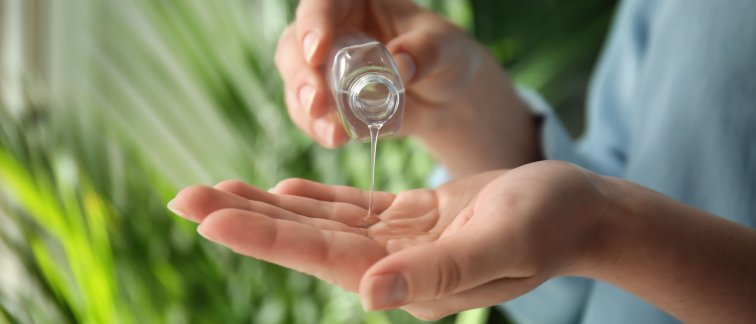Nu.nl
Disinfectant gel has become a permanent fixture. At the entrance of the supermarket, the cinema or as standard in the handbag. "It can really help to prevent infections. Washing your hands with soap and water actually makes the skin dry and vulnerable," says dermatologist Thomas Rustemeyer of the Amsterdam UMC.
"Most disinfectant gels have the same basis," says emeritus professor of toxicology Martin van den Berg. "Disinfectant gel contains at least 70 percent alcohol - we call this ethanol - and glycerine. The latter ingredient is added to prevent the alcohol from drying out.
"One hand gel smells of roses and the other of lavender, but there are no major differences in disinfection. "Makers of hand gel are allowed to add substances, but they must be approved. These are substances that are also used in the cosmetics industry. The basis is always ethanol and glycerine. The WHO health organization has stated the official recipe on the website."
“The eyes do not have the same protective layer as our hands, so alcohol can attack the mucous membranes of the eye. But in principle it is not the intention that disinfectant gel gets into your eye. ” Thomas Rustemeyer, dermatologist
Beware of the eyes
Alcohol is harmful. "Everyone who has drunk liquor knows that", says dermatologist Rustemeyer of the Amsterdam UMC. "It burns in the throat. It irritates the mucous membranes." There is no danger here for the hands. "Alcohol does not burn on the skin, because it has a barrier: the horny layer.
"Earlier, an ophthalmologist from the Rotterdam Eye Hospital warned against the dangers of hand gel for the eyes. The dermatologist understands that. "The eyes do not have the same protective layer as our hands, so that alcohol can affect the mucous membranes of the eye. But in principle it is not the intention that disinfectant gel gets into your eye.
"With normal use, the dermatologist sees no dangers. Disinfectant gel can irritate the skin. "If you have a wound, hand gel will sting faster. You no longer have a skin barrier at that spot. It is not dangerous, but it does cause a burning sensation."
"The good flora on the skin remains intact, while any harmful viruses or bacteria are suppressed." Thomas Rustemeyer, dermatologist
Alcohol inactivates viruses and bacteria. Doesn't that mean we lose good bacteria, which compromises our immune system? "The good news is: alcohol more easily inactivates viruses and bacteria that we get on our skin by contact. The good flora on the skin remains intact, while any harmful viruses or bacteria are suppressed," the dermatologist describes. "The viruses that get on your skin by touching surfaces can be destroyed with hand alcohol. They are not deep."
Gel or spray?
Alcohol evaporates quickly, toxicologist Van den Berg knows. "We're talking about ten seconds. If you disinfect your hands in a store and you rub afterwards, the alcohol is almost gone." According to him, gels work better than sprays. "The alcohol is in the gel, so it evaporates less quickly. You should not use hand gel sparingly if it is to have a good disinfecting effect."
As far as Rustemeyer is concerned, we will continue to use hand gel after the corona crisis. "It can really help to prevent infections. Washing hands with soap and water actually makes the skin dry and fragile. It leads to cracks and bacteria and viruses can more easily manage there," he explains. "Water and soap is only necessary if you have visible contamination."
Now that society is making intensive use of hand gel for the first time, for a longer period of time, the question arises: what are the long-term consequences for the body? None, says Van den Berg. "Because alcohol is hardly absorbed into the body through the skin, because of the rapid evaporation. This in contrast to drinking alcohol." Rustemeyer adds: "Hand alcohol has been used by surgeons to disinfect for decades."

